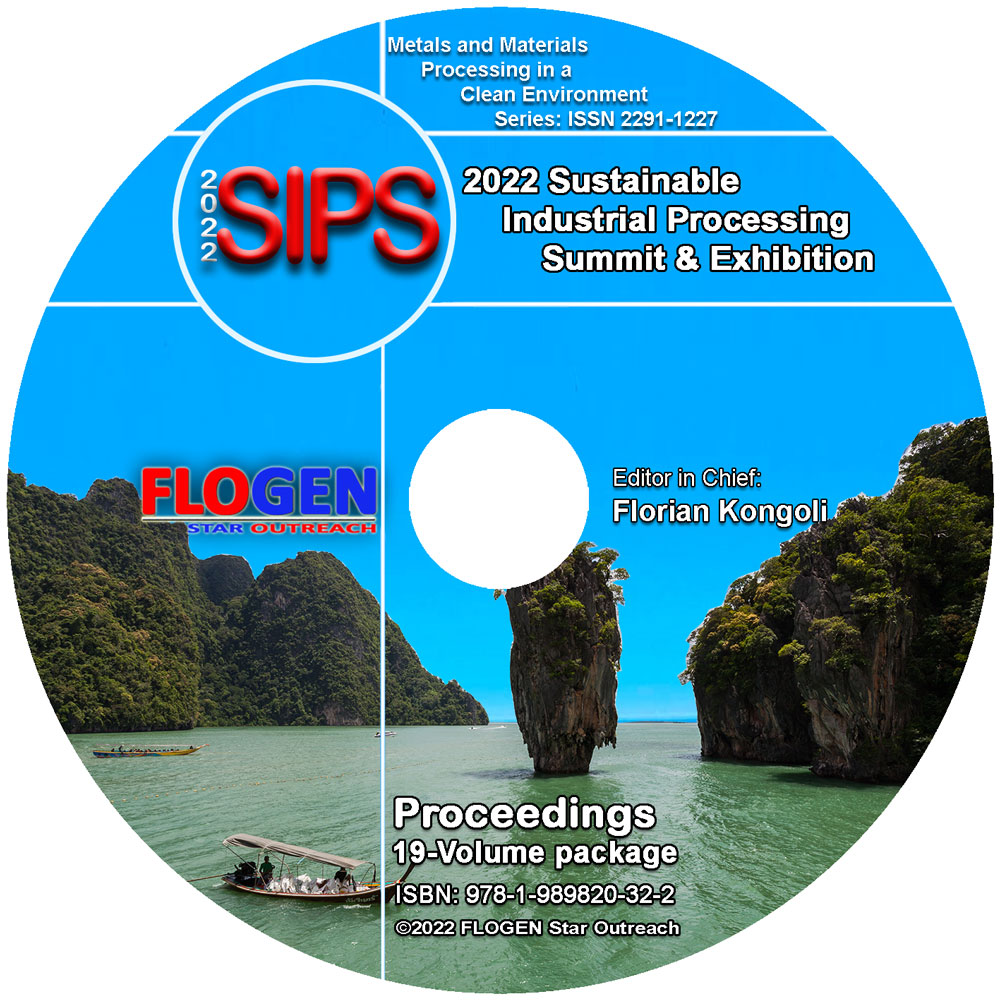2022-Sustainable Industrial Processing Summit
SIPS2022 Volume 15 Yoshikawa Intl. Symp Oxidative Stress of Human Beings
| Editors: | F. Kongoli, H. Inufusa, C. Amatore, H. Chen, W. Huang, H. Goor. |
| Publisher: | Flogen Star OUTREACH |
| Publication date: | 22 December 2022 |
| Pages: | 152 pages |
| ISBN: | 978-1-989820-62-9(CD) |
| ISSN: | 2291-1227 (Metals and Materials Processing in a Clean Environment Series) |

CD shopping page
Antioxidants and Cancer Cells
Fuhua YANG1; Yoshiaki Harakawa1; Naomi Okada2; Toshikazu Yoshikawa3; Haruhiko Inufusa4;1DIVISION OF ANTI-OXIDANT RESEARCH, GIFU UNIVERSITY, Gifu, Japan; 2GIFU UNIVERSITY, Gifu, Japan; 3LOUIS PASTEUR CENTER, Kyoto, Japan; 4TIMA, Gifu, Japan;
Type of Paper: Regular
Id Paper: 428
Topic: 54
Abstract:
Oxidative stress is involved in over 150 different diseases, and cancer is one of the most common. High oxidative stress can damage proteins and DNA that are essential to the body, leading to the formation of cancer over time. Oxidative stress in the body is also elevated in carcinoma carriers. When the body's oxidative stress is elevated, inflammatory substances increase, and the body's cancer immunity is reduced, which is thought to promote cancer cell growth and metastasis. Since antioxidants are thought to play an effective role in breaking this vicious cycle, we used the antioxidant compound Twendee X (TwX) to verify the effect of TwX on cancer cells through in vivo and in vitro experiments.
Human colon cancer RPMI4788 cells are used as cancer cells.
In in vitro experiments, the addition of 60 μg/ml of TwX to RPMI4788 cell culture medium slowed cell proliferation from 1 hour after addition, whereas the same concentration of the antioxidant Vitamin C did not inhibit cell proliferation. The inhibition of cell proliferation by the addition of TwX was not observed in normal cells.
A mouse model of lung metastasis was created by transplanting RPMI cells (2 x 104 cells/ml) into nude mice via intravenous tail injection. After 6 weeks of treatment with TwX (40 mg/kg/day), blood samples were taken, and oxidative stress in the plasma, lung metastasis, and NK activity was measured. The results showed that the oxidative stress level of the tumor-bearing mice was twice as high as that of normal mice, but TwX suppressed the increase from the normal level to less than half. Lung weights were also significantly lighter than controls. NK activity was significantly lower NK activity than normal mice, while the TWX group had twice higher NK activity as the carriers and 1.5 times higher than the normal mice.
These results suggest that TwX may suppress cancer metastasis by suppressing elevated oxidative stress, thereby increasing NK activity, which is cancer immunity. However, similar results may not be obtained in the case of single-component antioxidants. We believe that the results of this study will help antioxidants in cancer treatment and prevention.
Keywords:
Anti-Oxidants; Cancers; Oxidative Stress; MetastasisReferences:
1. Composition for protection against cell-damaging effects. WO/2013/072441 23.05.2013 (patent)2. Novel compositions and uses thereof WO 2008071790 A3
3. Suplatast tosilate reduces radiation-induced lung injury in mice through suppression of oxidative stress. Yusuke Izumi, Taku Nakashima, Noboru Hattori, Free Radic Biol Med.2019;136:52-59